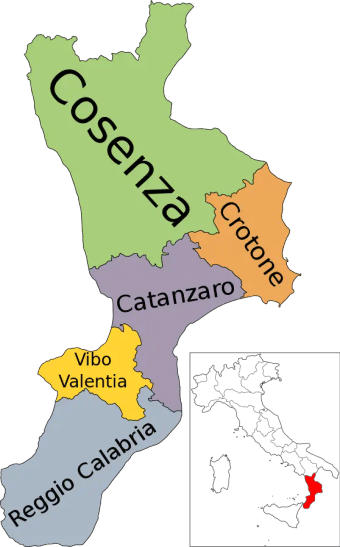Overview

The larger Vibo Valentia metropolitan area comprises 50 towns (comuni) and covers an area of 115.064 km2.
The population density is 139 inhabitants per km2, making it somewhat densely populated.
The male to female ratio is 1.00:1.03.
Vibo Valentia is in Calabria, Italy.
Search for:
Climate
The province of Vibo Valentia receives on average 240 hours of sunshine per month, or 8 hours of sunshine per day.NaN This is 1.69% more than the average for Italy and 4.99% less than the average for the region of Calabria.Throughout the year, it rains on average 8.15 days per month, which is well above average for an Italian province.
During the autumn and winter season, there are usually 0.29 days per month with fog and 0.67 cold days per month with perceived temperatures below 3°C.
In the summer, there are on average 20.18 hot days per month with perceived temperatures above 30°C.
Weather Now
name Region.NameCost of Living
The average monthly income in Vibo Valentia is around 979.78€, which is lower than the average for Italy.The estimated cost of living is around 974.46€ per month for an individual or 1465.38€ per month for a family of 4.
The cost for renting a small apartment (2-3 bedrooms) in a main city area is around 497.84€ per month.
Overall, Vibo Valentia is cheap compared to other Italian provinces.
Living in Vibo Valentia is around 40.95% cheaper than the average of all Italian provinces.
Quality of Life
Healthcare
Healthcare in Vibo Valentia is below average. For every 10k inhabitants, there are around undefined pharmacies, 10.18 general practitioners and 19.4 specialized doctors per 10k inhabitants.NaNAverage life expectancy in Vibo Valentia is very high at 82.2 years of age.
Education
Vibo Valentia has a lower-than-average percentage of high school graduates, around 55.7%; and a lower-than-average percentage of university graduates, around 22.8%.NaN The average number of completed years of schooling for people over 25 is 10.06, which is not far from the national average of 10.44.NaN There are no universities in this province.
Leisure
Overall, Vibo Valentia has pretty good nightlife with 2.66 bars and 3.6 restaurants per 10k inhabitants.
Crime and Safety
The province of Vibo Valentia is overall moderately safe for expats.As of 2021, there are an average of 2903.4 reported crimes per 100k inhabitants.
This is 2.39% higher than the national average.
There have been around 0 deadly road accidents and 15.1 serious work-related injuries per 10k people in Vibo Valentia.
This is respectively 100.00% less driving accidents than average and -17.05% less work accidents than average.
Car theft is reportedly 38.78% lower than average with only 43.18 cases per 100k inhabitants.
NaNReports of house thefts are 43.04% lower than average with 99.7 cases per 100k inhabitants.
NaNCases of robbery are uncommon with 99.7 reported cases per 100k inhabitants, about 2.48% less the national average.
Vibo Valentia has had issues with safety and crime rates in the past.
The province has experienced the influence of organized crime, including the 'Ndrangheta.
While efforts have been made to improve safety, it is important to exercise caution when visiting Vibo Valentia.
Instances of petty theft and pickpocketing can occur, particularly in crowded areas and tourist sites.
It is advisable to stay in well-populated areas, use reputable transportation, and keep personal belongings secure.
Vibo Valentia has made progress in enhancing safety measures, but it is still recommended to remain vigilant and aware of your surroundings.
Road accidents and reckless driving can also pose risks, so it is crucial to drive defensively and adhere to traffic regulations.
Transport
Public transport in Vibo Valentia is lacking, and traffic is very high.NaNThere are on average 0.78 active vehicles per person, against a national average of 0.66.
Around 0.00km per 10k inhabitants of the main city in Vibo Valentia consist of bicycle lanes.
This makes Vibo Valentia not very bike-friendly.
Discover
Recommended Tours in Calabria
Provinces Nearby



